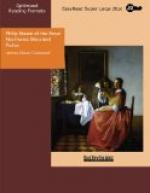“You are not alone in your sorrows, Felix MacGregor,” he said softly. “You asked me if I was beauty-proof. Yes, I am. And it is because of something like this, because of a face and a soul that have filled my heart, because of a woman that is not mine, and never can be mine, because of a love which ever burns, and must never be known—it is because of this that I am beauty-proof. God bless this little woman, MacGregor—and you—and I—will never ask where she has gone.”
MacGregor’s hand reached out and gripped his own in silence. In that hand-clasp there was sealed a pact between them, and Philip returned to his barracks room to write a letter, in care of his father, to the man and woman whom he had helped to escape into the south. He spent the greater part of that day writing. It was late in the afternoon that Moody came in with the mail.
“One for you, Phil,” he said, tossing a letter on Philip’s table. “Looks as though it had been through a war.”
Philip picked up the letter as the sergeant left him. He dropped his pen with a low whistle. He could see at a glance that the letter had come an unusual journey. It was dirty, and crumpled, and ragged at the ends—and then, on the back of it, he found written in ink, “Lac Bain.” His fingers trembled as he tore open the envelope. Swiftly he read. His breath came in a gasping cry from between his lips, his face turned as white as the crumpled paper, and then, as suddenly, a flush of excitement leaped into his cheeks, replacing the pallor. His eyes seemed blinded before he had half finished the letter, and his heart was pounding with suffocating force.
This was what he read:
My Dear Philip Steele:
Your letter, and the skull, came to us to-day. I thank God that chance brought me into my Isobel’s room in time, or I fear for what might have happened. It was a terrible punishment, my dear Steele, for her—and for me. But I deserved it more than she. That very night—after Isobel left the table—she insisted that I explain. When I returned to the room below, you were gone. I waited, and then went to your cabin. You know why I did not find you. Steele, Isobel is not my wife. She is my daughter.
Mrs. Becker had planned to come with me to Lac Bain from Fort Churchill, and we wrote the factor to that effect. But we changed our plans. Mrs. Becker returned on the London ship, and Isobel came with me. In a spirit of fun she suggested that for the first few hours she be allowed to pass as—well, you understand. The joke was carried too far. When she met you—and Bucky Nome—it ceased to be a joke, and almost became a tragedy. For those few minutes before the fire Isobel used her disguise as a test. She came to me, before you joined us, and whispered to me that Nome was a scoundrel, and that she would punish him before the evening was over. In the short space of that evening she knew that she had met one of the most despicable of blackguards in Nome, and one of the noblest of men in you. And not until she saw on you the effect of what she was doing did everything dawn fully upon her.




